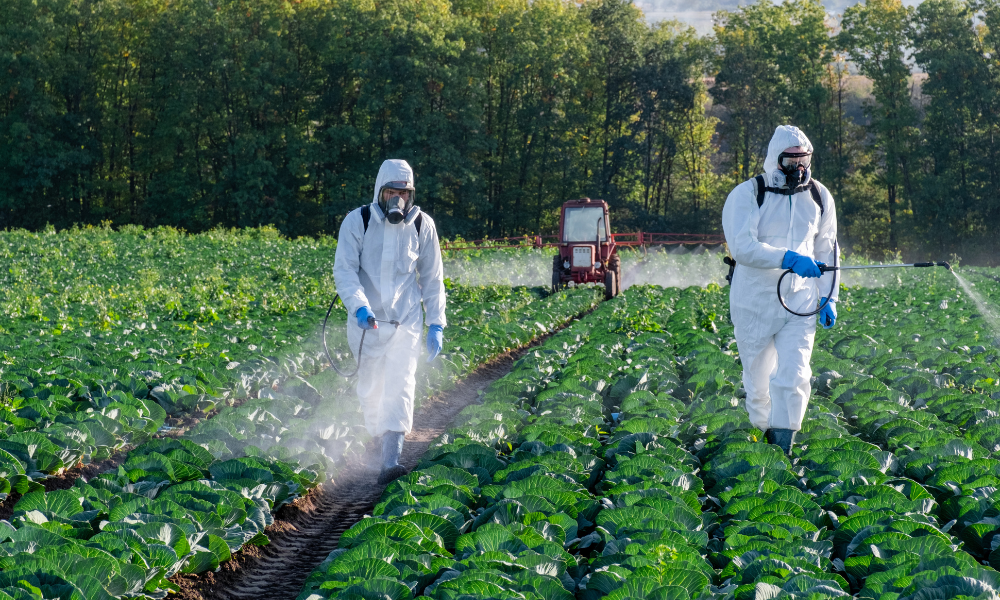

· By Renewed Health Co
The Dangers of Glyphosate (Roundup)
Glyphosate, the active ingredient in popular herbicides like Roundup, has long been a subject of controversy. While it currently is one of the most widely used herbicides globally, concerns have been raised about its potential dangers to human health and the environment. Let’s explore the evidence and research that have contributed to the ongoing debate surrounding the dangers of glyphosate.
Glyphosate Residues in Food
A concern is the presence of glyphosate residues in food. A report published by the Environmental Working Group (EWG) in 2018 detected glyphosate residues in a variety of popular cereals and oat-based products.
These residues are a result of glyphosate use in conventional agriculture, where the herbicide is sprayed on crops like wheat and oats as a desiccant before harvest. It is common to use desiccants to keep products dry.
Herbicides containing glyphosate are sprayed on nearly half of all planted corn, cotton, and soybeans grown in the U.S. These same crops can be used as grain to feed livestock – cattle, chickens, and pigs. FDA residue testing found glyphosate residues on a variety of crops, including oats, soybeans, grapes, oranges, apples, cherries, and beans.
In order for the USDA to certify a farm as organic, it cannot have used glyphosate for seven consecutive years, showing that glyphosate stays in the soil for a long time.
Glyphosate and Cancer
One of the most significant concerns regarding glyphosate is its potential link to cancer. In 2015, the International Agency for Research on Cancer (IARC), which is part of the World Health Organization (WHO), classified glyphosate as "probably carcinogenic to humans." This classification was based on the assessment of several studies, including the Agricultural Health Study (AHS) and animal studies.
The Agricultural Health Study (AHS), which was a long-term study conducted in the United States, has been instrumental in examining the potential health effects of glyphosate exposure. It reported a possible association between glyphosate and non-Hodgkin lymphoma (NHL).
Glyphosate and Gut Health
Some studies have suggested that glyphosate could potentially affect the gut microbiome, which is the microorganisms living in the digestive tract. The gut microbiome plays a crucial role in digestion, immunity, and wellbeing.
Glyphosate is designed to target an enzyme found in plants, but this enzyme is also present in some bacteria in the gut. Some research has raised concerns that the chemical glyphosate may disrupt gut bacteria balance by selectively killing some species.
There is also evidence to suggest that gut barrier function may also be affected by glyphosate. The gut barrier prevents harmful substances from entering the bloodstream. Disruption of this barrier can lead to increased intestinal permeability, often referred to as "leaky gut syndrome." Leaky gut syndrome is related to dozens of autoimmune diseases.
Environmental Impact
Beyond its potential impact on human health, glyphosate has been criticized for its environmental effects. Glyphosate can persist in soil and water, potentially harming non-target species. It may also contribute to the development of herbicide-resistant weeds, leading to increased herbicide use and environmental damage.
A study published in the journal of Environmental Sciences Europe in 2016 pointed to the potential harm to aquatic ecosystems due to glyphosate runoff. Glyphosate can disrupt the balance of aquatic ecosystems, impacting both plants and animals.
Regulatory Actions, Settlements, and Public Concern
Due to the controversies surrounding glyphosate, several countries and municipalities have taken regulatory actions. For example, the state of California added glyphosate to its list of chemicals known to cause cancer under Proposition 65. Additionally, 33 countries have banned the use of glyphosate altogether.
In 2020, Bayer, the parent company of Monsanto (the manufacturer of Roundup), agreed to a settlement of over $10 billion to address claims related to glyphosate.
In June of 2023, Bayer settled in New York state for $6.9 million, where the Attorney General said that Bayer misled consumers about the safety of Roundup. Plaintiffs in more than 100,000 lawsuits against Bayer claim glyphosate harmed them, including many saying it caused non-Hodgkin’s lymphoma. Bayer has announced they will stop selling residential formulas of Roundup starting sometime in 2023.
The very real dangers of glyphosate continue to be a subject of debate and research. If you have concerns, it's advisable for you to choose organic fruits, vegetables, and other organic foods, 100% grass fed / finished beef, organic chicken, and pasture-raised chicken eggs, and washing and peeling conventionally grown produce. This can help reduce potential glyphosate exposure.
For more information on which specific foods are heavily sprayed with herbicides and pesticides, check out a non-profit, American research organization, named Enviornmental Working Group (EWG), which advocates in the areas of agriculture and toxic chemicals.
They update their Clean 15 list - the top 15 produce with the lowest pesticide residue - and their Dirty Dozen – the list of top 12 produce with highest pesticide residue. Visit their website to learn more at www.ewg.org.
